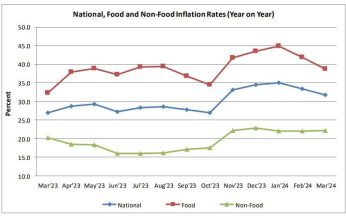World Bank to help Malawi up-scale warehouse receipts system
The World Bank has pledged to support Malawi in developing and up-scaling the warehouse receipts system (WRS) which, it says, has the potential to increase farmers’ income and reduce poverty in the country.
World Bank country manager for Malawi, Laura Kullenberg, made the pledge in Lilongwe on Tuesday when she addressed participants of a day-long consultative workshop for the up-scaling of the WRS in Malawi.
“Following a request from the Government of Malawi, the World Bank agreed to support the development and implementation of warehouse receipts system in the areas of sensitising the public on the operational feasibility and benefits of a WRS and assisting government to develop the necessary warehouse receipts legislation,” she said.
The training was organised by Ministry of Industry and Trade with support from Usaid, World Bank and the International Finance Corporation (IFC).
Agricultural Commodity Exchange for Africa and the Auction Holdings Limited have pioneered the warehousing receipts system in Malawi.
The system enables producers and traders to obtain funds from financial institutions using the receipts issued on products stored in certified warehouses as collateral.
According to Kullenberg, the bank will also help Malawi enhance the capacity of relevant stakeholders, especially financial institutions and commodity exchanges to better implement WRS in Malawi.
She said currently, World Bank, through IFC, has engaged experienced consultants to set up warehouse receipts and storage systems.
Kullenberg explained that while good progress has been made in WRS, there are still some challenges to the efficient operations of the system, citing the absence of a regulatory framework to protect various players while encouraging the system to grow.
“A regulated warehouse receipts system has the potential to ease access to rural finance by farmers and small traders, facilitate structured trade, mitigate price risks, and reduce storage loses,” she added.
Principal secretary in the Ministry of Industry and Trade, Alex Gomani, who officially opened the meeting, noted that the WRS is an important tool for agricultural development as it improves storage, promotes structured trade and enhances financing.
Gomani added that the system allows farmers to select the best time to sell their products, thus potentially increasing their profits.
Currently, the products that are traded on the commodity exchange include maize, pigeon peas, soya beans, sugar beans and groundnuts.
“Let me encourage the commodity exchange [organisations] to increase the number of crops being traded [so as] to increase the number of beneficiaries and the sectors that can profit from the system,” he said.





